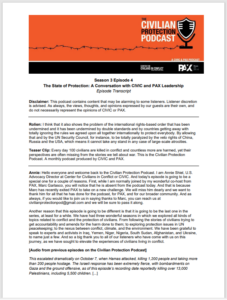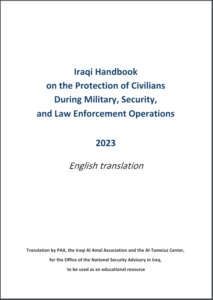Five years after Hawija, what lessons did we learn?
The bombing of an IS bomb factory in Hawija by Dutch F16s, exactly five years ago today, killed more than seventy and injured more than a hundred civilians. Five years later, and only after pressure from the media and civil society, the Netherlands has finally taken some first steps towards more openness and accountibility for the victims of Hawija. But there is still a long way to go. The Netherlands has yet to identity the victims, identify which assistance they still need and how much compensation is appropriate.
In addition, the discussion about the future has yet to start: How are we going to ensure that next time the Netherlands participates in a mission, an open and mature dialogue is possible on the basis of all the facts? And how do we ensure that the lessons we learn from Hawija are used in such a way that the number of civilian casualties is further reduced?
Many survivors of the Dutch attack on Hawija no longer live in Hawija itself, but in Tikrit, Kirkuk or other cities in the region. Many do not like to talk about what what happened in Hawija. Because it causes grief, or because they fear stigmatisation – what were they doing in that IS stronghold in 2015? This makes it difficult to locate witnesses and victims. But it is not impossible. The entire area has been recaptured from IS since 2017 and is relatively safe and accessible. Local partners of PAX have been able to work in the area for quite some time. Some local organizations have come a long way in mapping the victims. A number of victims even sued the Dutch state with the help of lawyer Liesbeth Zegveld – they want answers, justice and compensation for their suffering and material damages.
The Netherlands is not ready for that yet. The Netherlands admitted its role in the attack on Hawija only in November 2019. Since then, most attention has gone to the question who exactly knew what happened and when, and why information was withheld from Parliament. These are important questions indeed, for the healthy functioning of a parliamentary democracy. It is important that Parliament realizes that it has not been able to properly perform its parliamentary oversight duties in recent years.
A number of important conversations have yet to start altogether though. How do we ensure that the victims of Hawija and other attacks – past and future – are properly identified, assisted and compensated? And how do we use the lessons of Hawija to further reduce the number of civilian casualties? What lessons about transparency and accountability to parliament and the public do we draw from the five years that the Netherlands has looked away from the civilian suffering it caused in Hawija? And more importantly – what do we do with those lessons? What minimum requirements do we, as a country, place on the availability and control of information when we decide to participate in another mission? What standards of transparency to our own parliament do we set and how do we make sure that these standards will not again become part of the political bargaining prior to a mission?
Internationally, there is currently much debate about the consequences of the use of explosive weapons in populated areas. This offers an excellent opportunity for the Netherlands to make a constructive international contribution to new agreements about greater restraint and transparency in relation the use of explosive weapons in populated areas.
Here in the Netherlands, PAX and a couple of other specialist organisations are currently discussing with the Ministry of Defense a way in which we can answer the above questions. We offer the Ministry our joint expertise because we believe that in this case, cooperation between military, humanitarian and academic specialists offers the best chance of a good result. What that result is? That the next time the Netherlands takes part in a mission, we can openly discuss and set goals, monitor them, make adjustments and take decisions based on the facts. That we’re better enabled to use the facts to prevent civilian casualties. And that we will become a country that by default takes responsibility immediately towards the civilian casualties who will, for sure, fall in a next mission.
About this news
Date of publication:
Jun 03, 2020
Author:
Wilbert van der Zeijden
Publisher:
PAX Protection of Civilians
Extra:
Photo: The aftermath of the alleged strike in Hawijah (via Iraqi Revolution)

